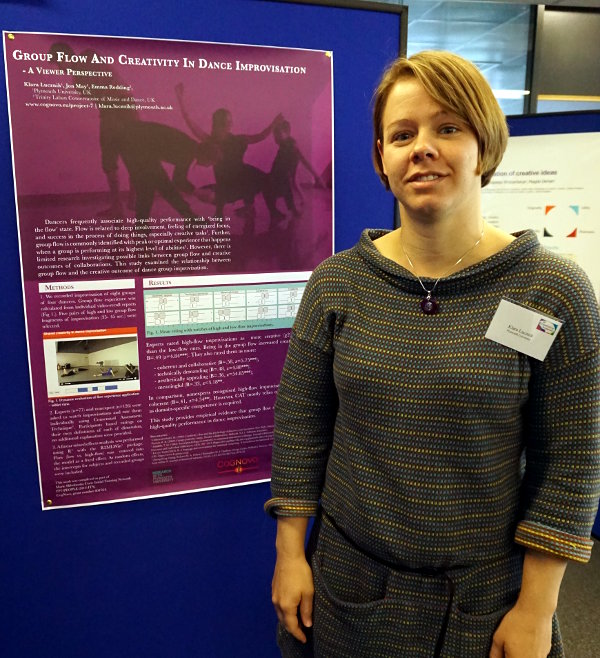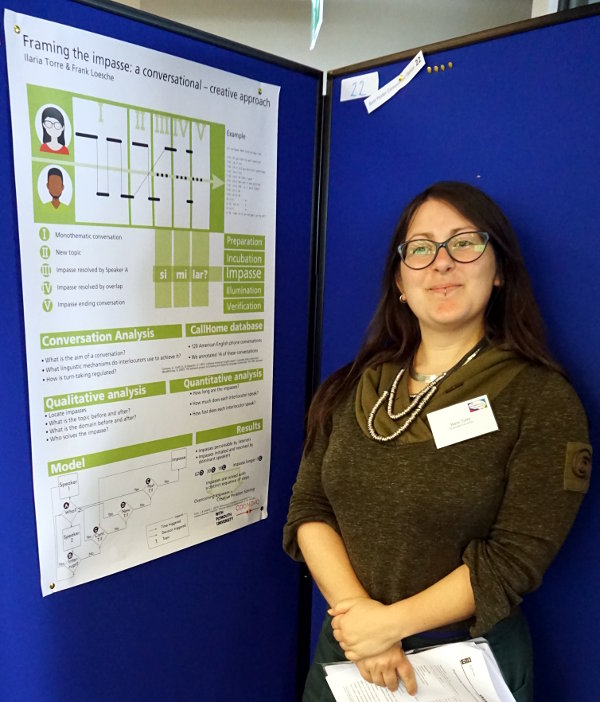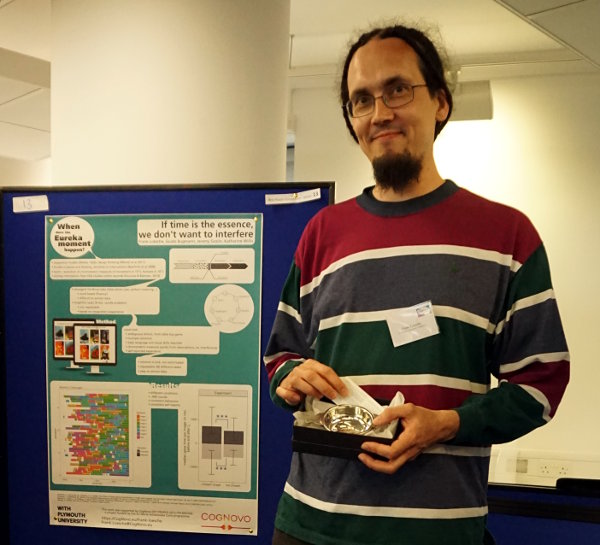




Three CogNovo research fellows are participating in the UK Creativity Conference held at the Edinburgh Napier University on 17th May 2017. Klara, Ilaria, and Frank are participating and are contributing a total of four posters to the poster session to show results from their PhD projects and related work, one of which won the "Best Poster Award".
Based on her PhD project "Shared Creativity in Dance", Klara Łucznik is presenting a poster entitled: "Group flow and creativity in dance improvisation – a viewer perspective". Using the consensual assessment technique of experts' judgments, this study demonstrate that shared, group flow experience in not only highly enjoyable state for dancers, but it also enhances their high-quality performance and creative outcomes of their creation.
Frank Loesche demonstrates a novel experiment that allows chronometric measurements of Eureka moments without interfering with the creative problem solving process of the participants – hence the poster title "If time is the essence, we don't want to interfere". The experiment is one of the outcomes of his PhD project "Unconscious Creativity: The Eureka Moment", a multidisciplinary approach to creative problem solving situated between the School of Computing, Electronics and Mathematics, the School of Psychology, and the School of Art, Design and Architecture. The approach seem to have resonated with many of the attending researchers as the work received the "Best Poster Award" at the meeting.
Ilaria Torre and Frank Loesche are also presenting a poster speculating on the shared features between conversations and creative problem solving using a mixed-methods approach. "Framing the impasse: a conversational-creative approach" is based on a paper they wrote together for the special issue of "Creativity. Theories – Research - Applications". This collaboration is one of the outcomes of the interdisciplinary doctoral training centre CogNovo, which is also the topic of the fourth poster.
In "CogNovo – A Case Study for Cognitive Innovation" Frank Loesche, Ilaria Torre, Diego S. Maranan, and Susan L. Denham explain the setup of CogNovo and how it can be utilised to study creativity and other elements of cognitive innovation. CogNovo focuses on creativity and the research on creativity in diverse groups and teams, targeting interdisciplinary and collaborative team work particularly in an academic environment. Given a successful interpretation of the data gathered in the CogNovo project, the methodology can be expanded to other academic and non-academic environments requiring Cognitive Innovation.
UK Creativity 2017 seems like a perfect match to present and discuss these works. Professor Giovanni Corazza from the Marconi Institute for Creativity in Bologna gave a keynote on "The dynamic universal creativity process: evolving revolutions" arguing from a pragmatist point of view for a dynamic definition of creativity and for the importance of creativity in general. During the morning presentations Professor Kenneth Gilhooly gave an overview over his work on incubation and emphasized a potential link to the Unconscious Thought Theory. Dr George Georgiou continued on the topic of incubation, focusing also on the influence of thought suppression and ego depletion. The third talk during the morning session was given by Dr Kathryn Friedlander who introduced a novel task to observe insight problems utilising cryptic crossword puzzles. The afternoon session was opened by Dr Alison Pease who gave an overview on computational creativity using the metaphor of front stage / back stage communication in (mathematical) research. Finally Dr Paul Sowden argued to pay more attention to affect in studies of creativity and he also emphasised the dynamic changes of awareness playing a role in the creative thinking processes. During the whole day and especially the final discussion panel on impact, skills, and collaborations, the speakers emphasised the importance of creativity in the society, education, and businesses. #UKCreativity2017, the first conference of its kind, focused on creativity, insight, problem-solving, incubation, and cognition and contributed to improving the visibility and strength of creativity research.